Regulating Energy Use: Smart Home Scheduling Techniques

Understanding Smart Home Technology for Energy Regulation
Smart home technology has revolutionized how we manage energy use in our households. With devices that can be controlled remotely, homeowners can automate various functions, such as lighting and heating, to enhance efficiency. Imagine being able to adjust your thermostat from the office or schedule your lights to turn off at a specific time—this is the convenience and control that smart homes provide.
The future is green energy, sustainability, renewable energy.
This technology integrates with various devices, including smart thermostats, plugs, and lights, creating a cohesive system. By utilizing these tools, you can monitor your energy consumption patterns and make informed decisions on when to use energy. It’s like having a personal energy manager right at your fingertips, guiding you toward more sustainable habits.
As you become more acquainted with smart home technology, you’ll find that it not only saves energy but also reduces costs. By setting schedules and automating tasks, you can avoid unnecessary energy use during peak hours, leading to a more efficient and cost-effective home. This blend of technology and strategy fosters a greener lifestyle and promotes energy conservation.
The Benefits of Scheduling Energy Use
Scheduling your energy use is like setting a routine for your home—just as you wouldn’t leave the lights on all day, why let your appliances run unnecessarily? By creating a structured schedule, you can ensure that devices are only active when needed. This can lead to significant energy savings and a reduced carbon footprint, making your home more environmentally friendly.

Moreover, it helps you take advantage of off-peak electricity rates. Many utility companies offer lower rates during specific hours, typically at night or early morning. By adjusting your energy consumption to these times, you can save money while also easing the strain on the grid during peak hours, similar to how we stagger our schedules to avoid rush hour traffic.
Smart Tech Boosts Energy Efficiency
Smart home technology allows homeowners to automate energy use, leading to enhanced efficiency and cost savings.
Beyond financial savings, scheduled energy use can enhance your overall comfort. Imagine returning to a perfectly heated home after a long day or walking into a well-lit room without needing to flip a switch. These small conveniences can significantly contribute to a more enjoyable living environment, making the initial effort of scheduling worthwhile.
Key Smart Devices for Effective Scheduling
To implement effective energy scheduling, you’ll want to invest in the right smart devices. Smart thermostats, for example, allow you to set temperature schedules based on your daily routine. This means your heating or cooling can adapt to when you’re home versus when you’re away, ensuring optimal comfort without wasting energy.
Energy conservation is the foundation of energy independence.
Smart plugs are another fantastic addition, enabling you to control when specific appliances are used. Want your coffee maker to start brewing just before you wake up? Or how about having your devices automatically shut off when you leave for work? These little adjustments can make a big difference in your overall energy consumption.
Lastly, smart lighting systems can be a game changer. With the ability to schedule when lights turn on or off, you can ensure that no lights are left burning when they’re not needed. These devices work together to create a seamlessly efficient energy management system that feels intuitive and easy to use.
Creating a Smart Home Energy Schedule
Developing a smart home energy schedule begins with assessing your daily routines and identifying energy usage patterns. Start by tracking when you typically use major appliances and lights throughout the day. This insight will guide you in creating a tailored schedule that aligns with your habits, maximizing energy savings.
Once you have a clear picture of your energy usage, use your smart devices to set specific schedules. For instance, program your thermostat to lower the temperature during the day when you're at work and to warm up before you return home. It’s like planning a dinner party—timing is everything, and a well-thought-out schedule can elevate your experience.
Scheduling Saves Money and Energy
Creating a structured energy schedule helps you reduce waste and take advantage of lower off-peak electricity rates.
Regularly review and adjust your schedule to accommodate changes in your routine or energy prices. Just as seasons change and our needs evolve, your smart home schedule should adapt. This flexibility ensures that you continue to optimize energy use without sacrificing comfort or convenience.
Integrating Renewable Energy Sources
Incorporating renewable energy sources into your smart home can amplify your energy-saving strategies. Solar panels, for instance, allow you to harness the sun's power, reducing reliance on conventional energy sources. By scheduling your energy use to align with peak solar production times, you can maximize your savings and decrease your carbon footprint.
Imagine a scenario where your smart home knows to run high-energy appliances, like the dishwasher or washing machine, when solar energy is at its peak. This not only saves you money but also contributes to a more sustainable lifestyle. It’s like synchronizing your daily activities with nature’s rhythms for a harmonious energy experience.
Combining renewable energy with smart scheduling creates a powerful approach to energy management. As you become more energy-conscious, you’ll find that these systems not only benefit your wallet but also support broader environmental goals. It’s a win-win situation for both your home and the planet.
Monitoring and Adjusting Your Energy Use
Monitoring your energy use is crucial for optimizing your smart home’s performance. Many smart devices come equipped with apps that provide real-time data on your consumption. By regularly checking these insights, you can identify trends and make necessary adjustments to your schedules, similar to how you might tweak a recipe based on taste tests.
Setting energy goals can also motivate you to stay on track. Whether it’s reducing your monthly bill or cutting down on energy waste, having clear objectives helps you remain focused. Think of it as a fitness journey—tracking your progress keeps you accountable and encourages you to strive for better results.
Renewables Enhance Energy Management
Integrating renewable energy sources with smart devices maximizes savings and supports a sustainable lifestyle.
As you monitor and refine your energy use, don’t hesitate to experiment with different schedules. What works for one household may not suit another, so finding the perfect balance takes time. With patience and persistence, you’ll develop a smart home system that operates at peak efficiency, delivering comfort and sustainability.
The Future of Smart Home Energy Management
The landscape of smart home energy management is continuously evolving, with new technologies emerging to enhance efficiency. Innovations such as artificial intelligence and machine learning are making it possible for smart devices to learn from your behavior and adapt automatically. This means less manual scheduling for you and more seamless energy management.
Imagine a home that can predict your energy needs based on weather forecasts or changes in your schedule. With advancements in technology, this level of adaptability is becoming increasingly feasible. It’s like having a personal assistant who knows your preferences and optimizes your home’s energy use without you lifting a finger.

As we look to the future, embracing smart home scheduling techniques will be more important than ever. With a growing emphasis on sustainability and energy conservation, these technologies will not only enhance our comfort but also play a vital role in preserving our planet for future generations. So, get ready to embrace the future of energy management—it's bright!